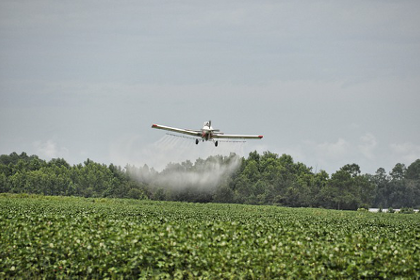
Monsanto Draws State Heat Over Drift
The Monsanto Co. caught the attention -- and much of the aggravation -- of the pesticide committee of the state Plant Board on Monday as it tried to address damage wrought by the illegal spraying of dicamba on some cotton and soybean fields in the state.
Monsanto this spring released its new soybean, called Roundup Ready 2 Xtend, which is tolerant of dicamba, a readily available herbicide used in varying formulations.
July 26, 2016 | Source: Northwest Arkansas Democrat Gazette | by Stephen Steed
The Monsanto Co. caught the attention — and much of the aggravation — of the pesticide committee of the state Plant Board on Monday as it tried to address damage wrought by the illegal spraying of dicamba on some cotton and soybean fields in the state.
Monsanto this spring released its new soybean, called Roundup Ready 2 Xtend, which is tolerant of dicamba, a readily available herbicide used in varying formulations. Some Arkansas farmers were drawn to buying and planting the Xtend beans after China decided to accept them in February. The European Union decided just last Friday to also accept Xtend beans.
However, dicamba is susceptible to drifting with the wind to adjacent crops that are not dicamba-tolerant. Because of that, it is illegal to spray dicamba across crops or over the top of them. With the China market opening, but after an infestation of pigweed, which is growing in its resistance to most other herbicides, some Arkansas farmers turned to dicamba, illegally.
Members of the pesticide committee asked how Monsanto, which had at least two representatives at the meeting, could release a new soybean seed without an accompanying, and legal, herbicide. They also asked what action Monsanto would take against farmers who illegally sprayed dicamba.
Monsanto expects its new dicamba-based herbicide, which is less susceptible to drift, to be approved by the EPA early this fall, said Boyd Cary, one of the Monsanto representatives. In response to critics on the panel, Cary said, “It’s always preferable to have people want to do the right thing.”
Cary said Monsanto would look at ways to punish farmers who violate the law while using Monsanto products but that revoking licenses was “difficult if not impossible.” He said Monsanto worked hard to let farmers know to not use dicamba on Xtend crops.
Danny Finch, a pesticide committee member from Jonesboro, noted that a representative of the Dow Chemical Co., in a separate but related discussion earlier in the meeting, was clear in saying that Dow would revoke a farmer’s use of its technology if caught doing wrong. “We just heard that Monsanto wouldn’t do anything,” Finch said.
Rachel Hurley, Monsanto lawyer, insisted that the company is looking at potential penalties for “bad actors.”
